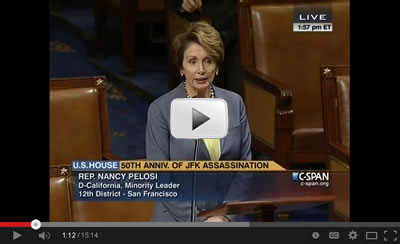Focus on the Future
Early Childhood Education
Over 50 years ago, President Kennedy stated, "Children are the world's most valuable resource and its best hope for the future." As Congress comes to the negotiating table on the budget, Congress must take seriously our responsibility to America's children, our families, and our country's future.
Investing in a strong education is an economic necessity for our country and for the American people. It means better jobs in our communities, greater opportunities for our young people, and higher wages for our workers – and it must begin in pre-school and continue through all lifelong learning opportunities.
The bipartisan ‘Strong Start for America's Children Act' – recently introduced by Congressman George Miller – is an essential step forward in upholding our commitment to the next generation and preparing our children for success in school and throughout their lives. Building on President Obama's call for universal pre-school and ongoing work at the state level, this measure helps ensure America's youth is ready to excel, inside and outside the classroom.
From early childhood through college and beyond, education remains the best investment individuals can make in themselves, parents can make in their children, and a nation can make in its future.
Another Blank Agenda
The American people need Congress to get serious and get to work creating jobs, growing the economy, and strengthening the middle class. But as we near the end of one of the least productive years in congressional history, the House GOP leadership has unveiled its agenda for 2014: a BLANK sheet of paper.
House Democrats are ready to act now and work with Republicans to address the major issues facing our country like finalizing a budget blueprint, strengthening the Affordable Care Act, and acting upon key legislative priorities that would easily pass the House, but are being obstructed by Speaker Boehner: comprehensive immigration reform, background checks and the Employment Non-Discrimination Act.
Americans cannot afford more of the same from the Do-Nothing Congress.
Getting Covered California
The Affordable Care Act makes quality care more affordable and more accessible for all Americans, finally slowing the skyrocketing growth of health costs. Three years after the enactment of the Affordable Care Act, a new report shows that the growth of health costs has slowed to the lowest level on record. That is good news for families, good news for businesses, and good news for the economy.
Every day, thousands of Americans are signing up for the coverage made possible by the Affordable Care Act. In our state, Covered California makes it easy for uninsured individuals and small businesses to shop for, compare and purchase health insurance. Just last week, the number of Covered California applications completed each day exceeded 10,000. I am also particularly excited that young people are enrolling for Covered California at the same rate as the rest of the population. To keep yourself up to date on exciting news regarding our state's health care system, I encourage you to follow Covered California on Twitter.
If you are interested in reviewing which health care plan may be best for you, please visit the Covered California website and utilize the potential insurance cost calculating tool. You may also be interested in taking a look at my newsletter on Covered California, which is also available in Chinese and Spanish.
Please be assured that I will continue to look for ways to strengthen the Affordable Care Act, preserve these historic reforms, and make this law work for the middle class and all Americans.
Grants Spotlight
I am pleased to announce that 50 organizations in San Francisco have received a competitive, 2014 federal grant from the National Endowment for the Arts (NEA).
NEA grants help support both individual and group initiatives in the arts. Projects include commissions, residencies, rehearsals, workshops, performances, exhibitions, publications, festivals, training programs and literature fellowships. These grants both enrich and spur economic growth in the communities we live in. Grants from the NEA generate, on average, $9 from non-federal sources for each $1 awarded.
If you or an organization you know may be interested in receiving grants to help fund a variety of art initiatives, please visit www.arts.gov to view application guidelines and more details about these funding opportunities. I also encourage you to sign up for my monthly grants e-newsletter to learn about a number of local, state, and federal grants.
